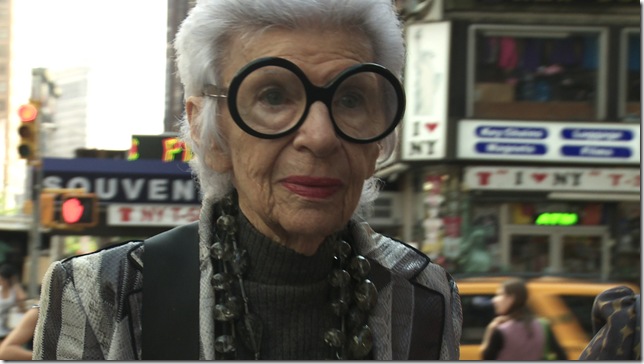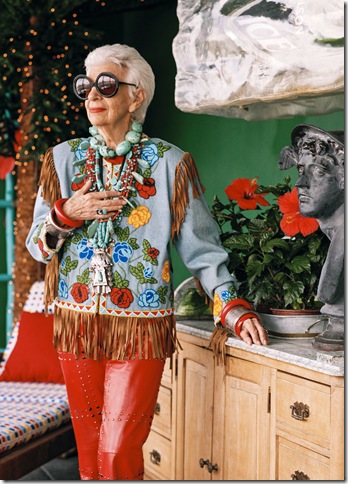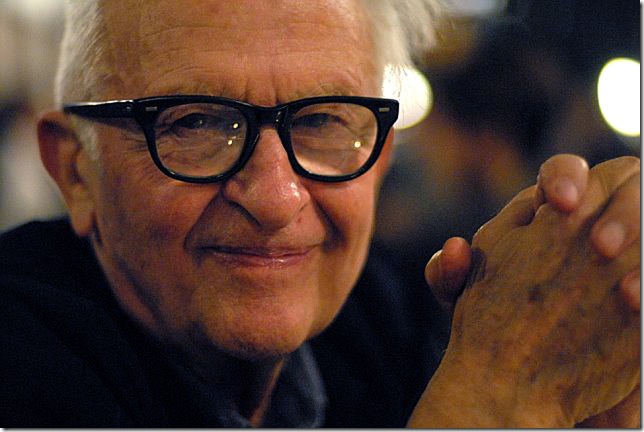Palm Beach fashion icon Iris Apfel, 93, has been a businesswoman, an interior designer and a university professor.
She now adds to her résumé “documentary subject,” as Magnolia Pictures prepares to release the last movie by the late acclaimed non-fiction filmmaker, Albert Maysles, titled simply Iris.
The film almost did not happen. “At first, I wasn’t interested at all. I just thought it was kind of silliness, because I wasn’t very well-known and why would be interested in a film about me?” asks Apfel. “So to make a long story short, I said ‘no,’ and then Linda Fargo, who is one of the head people at Bergdorf-Goodman, a good friend of mine, said ‘You must be insane. People would drop dead to have Albert even take a still photograph of them, and you’re refusing? What’s wrong with you?’
“Anyway, we subsequently got together,” continues Apfel, a bit sheepishly. “I went up to Harlem to their studios, I had a visit with the staff and we kind of fell in love. And so we decided to do it and I did it on blind faith because there was no script. I had no idea what he had in mind. I don’t know whether he did either, at the beginning.”
Born in Astoria, Queens, in 1921, and schooled in art at NYU and the University of Wisconsin, Apfel learned about fashion on the job, working at the industry bible, Women’s Wear Daily. In 1948, she met and married Carl Apfel, and together they founded and ran the fabric company Old World Weavers, until they retired in 1992.
In retirement, Apfel hardly took it easy, but had the time and the means to indulge her love of fashion with herself as the canvas. She likens her fashion sense to jazz.
“Because jazz is improvisation. I improvise,” she explains. “I take some things and mix them with other things that are unexpected. The way you do a riff with some notes that really shouldn’t be there, but it just does the trick.”
Apfel’s taste tends towards bold colors and patterns, juxtaposed in ways that seem unconventional. She rankles at the term. “I don’t try to be unconventional,” she insists. “Some people try very hard to be different. I don’t. I do what I want to do and I hope it’s within bounds. I’m a great believer in being appropriate.”
A significant part of her career was working on the interior restoration at the White House, from 1950 to 1993, from the administration of Harry Truman to Bill Clinton. And no, she was not able to inject a little Apfel boldness there, even if she wanted to.
“Nobody understands what goes on at the White House. You don’t do any interior design. A perfect historic restoration is just doing as exact a replica as you can of what went before,” she explains. “It could be the most hideous thing in the world. I remember when we were doing one of the early Teddy Roosevelt houses. It was so ghastly. It had all these dark, ugly puce-y colors, but we had to keep it that way, because that was the way it was.
“I mean, you’re not engaged to make a pretty house. There usually is something you have to follow, like an inventory or sketches, early photographs or something. And then you do your best to make it as historically accurate as you can. God forbid if the first ladies put their two cents in. Can you imagine a mix of, how shall we say, Mrs. Reagan and Hillary Clinton and Mamie Eisenhower?”
Although Apfel’s fashion sense definitely draws attention to her, she describes herself as a private person. “Even this is a lot to divulge, not that it’s anything special. I don’t discuss my affairs with people, even close friends.” As she comments on the film crew, “I have to say they were very, very protective of me. When we went out, unless they were specifically engaged, they were very, very in the background, shall we say. I didn’t even know they were there.”
Apfel first gained national attention when the Metropolitan Museum of Art’s Costume Institute did a show on her and her wardrobe in 2005, a show that later traveled to the Norton Museum and other major institutions. She is bracing herself for another wave of celebrity when Iris is released Wednesday.
“Well, they tell me that will happen. I suppose so,” she muses. “It’s intrusive in a way, and yet it’s very flattering at the tender age of 93 to be a geriatric starlet.”
Through the filming, she became friends with Maysles, who died in early March. “It’s a sad loss to the world, because his work was something special and he worked in his own particular way,” she says. “It’s nice to do your own thing if you have a thing to do. I think he was masterful. I was kind of surprised that he chose me as a subject, because he usually took more socially important causes. I was very worried that I would come out as some empty-headed fashionista, which I certainly am not. I love clothes, I love to get dressed, but it’s not my life.”
Finally, Iris, what is your philosophy of style? “Attitude, attitude, attitude. I think you have to be yourself and if you really want individual style, you have to express yourself. You’ve got to know yourself and express yourself in the best possible way. Whatever makes you happy.
“My look just happens to be the way I see life,” Apfel says. “People tell me I’m my own best canvas. And that’s the way it should be. If you don’t want to get to know yourself and express yourself, then don’t do it. It’s not urgent. The fashion police are not going to drag you away.”
So says the geriatric starlet.


